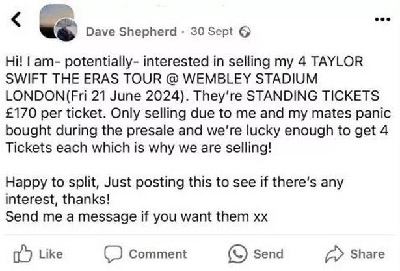Ticket scams are on the rise on social media, with Taylor Swift’s Eras tour a popular bait in 2024.
Best-selling and sold-out music tours are often a successful lure for scammers looking to rip off music fans, and with certain gigs becoming increasingly difficult to obtain tickets for – such as Taylor Swift’s Eras Tour – scammers are upping their game.
Most prolifically these scams occur on Facebook, where they are initiated by fake posts and Marketplace listings, often posted by compromised accounts of real people. Many victims have reported that they believed they were buying tickets from their friends without realising their friend’s accounts had been taken over by scammers.
Below is an example of a post falsely offering tickets for Taylor Swift using an account that had been compromised by scammers.


Ticket scams can be very hard to spot since people do genuinely turn to social media to sell on unwanted tickets, and Facebook, unsurprisingly, has taken a somewhat lackluster approach to spotting these scams.
Sponsored Content. Continued below…
However if you follow some simple tips, you can limit your chance of being a ticket scammer’s next victim.
Finally, it’s worth remembering that if you purchase tickets from strangers online, there is always a risk attached to these sorts of transactions. (The only risk-free approach is to only use authorised and reputable retailers.) If something feels off you’re not entirely sure a person is genuine, the only sound advice is to keep your wallet or purse firmly shut.
Thanks for reading, we hope this article helped, but before you leave us for greener pastures, please help us out.
We're hoping to be totally ad-free by 2025 - after all, no one likes online adverts, and all they do is get in the way and slow everything down. But of course we still have fees and costs to pay, so please, please consider becoming a Facebook supporter! It costs only 0.99p (~$1.30) a month (you can stop at any time) and ensures we can still keep posting Cybersecurity themed content to help keep our communities safe and scam-free. You can subscribe here
Remember, we're active on social media - so follow us on Facebook, Bluesky, Instagram and X